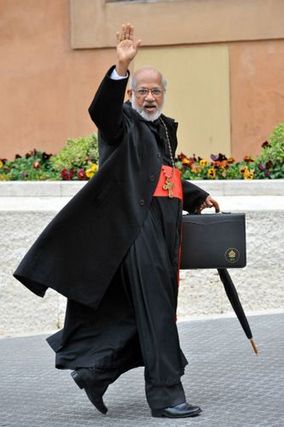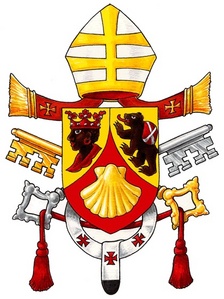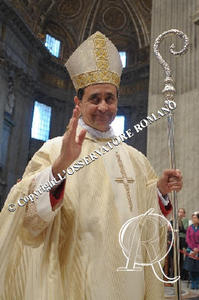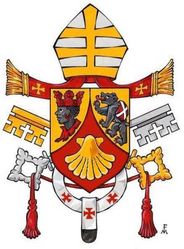 The Cardinals have determined that the Conclave will begin on 12 March 2013. The Votive Mass Pro Eligendo Pontifice (For the Election of the Pontiff) will be offered in the morning at Saint Peter's Basilica by the Cardinal Dean and later that afternoon the cardinals will process from the Pauline Chapel to the Sistine praying the Litany of Saints.
The Cardinals have determined that the Conclave will begin on 12 March 2013. The Votive Mass Pro Eligendo Pontifice (For the Election of the Pontiff) will be offered in the morning at Saint Peter's Basilica by the Cardinal Dean and later that afternoon the cardinals will process from the Pauline Chapel to the Sistine praying the Litany of Saints.Recently in Canon Law (Church Law) Category
 The Cardinals have determined that the Conclave will begin on 12 March 2013. The Votive Mass Pro Eligendo Pontifice (For the Election of the Pontiff) will be offered in the morning at Saint Peter's Basilica by the Cardinal Dean and later that afternoon the cardinals will process from the Pauline Chapel to the Sistine praying the Litany of Saints.
The Cardinals have determined that the Conclave will begin on 12 March 2013. The Votive Mass Pro Eligendo Pontifice (For the Election of the Pontiff) will be offered in the morning at Saint Peter's Basilica by the Cardinal Dean and later that afternoon the cardinals will process from the Pauline Chapel to the Sistine praying the Litany of Saints.Pope Benedict XVI appointed Attilio Cardinal Nicora, as president of the newly created Financial Information Authority (FIA). Until now, the cardinal has been the head of the Administration of the Patrimony of the Holy See. Also appointed on Wednesday were the members of the executive council of the FIA:
- Claudio Bianchi, former professor of accounting at Rome's La Sapienza University;
- Marcello Condemi, associate professor of economic law at Rome's G. Marconi University;
- Giuseppe Dalla Torre del Tempio di Sanguinetto, rector of Rome's LUMSA University;
- Cesare Testa, former president of the Central Institute for the Sustenance of the Clergy.
Surprisingly, no North Americans were appointed.
The Financial Information Authority was formed on December
30 as an "autonomous and independent body with the specific task of
preventing and countering the laundering of money and the financing of
terrorism with respect to each subject, both legal and physical, entity and
institution of whatever nature, of Vatican City State, of the Dicasteries of
the Roman Curia and of all the other institutions and entities dependent on the
Holy See."
Decree of
erection of the Personal Ordinariate of Our Lady of Walsingham
The supreme law of the Church is the salvation of souls. As such, throughout its history, the Church has always found the pastoral and juridical means to care for the good of the faithful.
With the Apostolic Constitution Anglicanorum coetibus, promulgated on 4 November 2009, the Holy Father, Pope Benedict XVI, provided for the establishment of Personal ordinariates through which Anglican faithful may enter, even in a corporate manner, into full communion with the Catholic Church. On the same date, the Congregation for the Doctrine of the Faith published Complementary Norms relating to such Ordinariates.

La Civiltà Cattolica, the academic periodical edited by the Society of Jesus but vetted by the Secretary of State of His Holiness, will publish Bishop Juan Ignacio Arrieta's essay, "The Influence of Cardinal Ratzinger in the Revision of the Canonical Criminal Justice System."

Bishop Juan Ignacio Arrieta Ochoa de Chinchetru, 59, is Spanish, ordained for the Prelature of the Holy Cross. Arrieta earned a doctorate in civil and canon law and served as Dead of the Faculty of Canon Law at the Pontifical University of the Holy Cross. (Rome) Moreover, he was Dean of the Institute of Canon Law of Saint Pius X (Venice). At the service of the Church, Arrieta was a canon prelate of the Apostolic Penitentiary and legal secretary of the Supreme Tribunal of the Apostolic Signatura. Since 2007, he's been the Secretary of the Pontifical Council for Legislative Texts and ordained bishop in 2008.
In the coming weeks, the Pontifical Council for Legislative Texts will distribute to its Members and Consultors the draft of a document containing suggestions for the revision of Book VI of the Code of Canon Law, the basis of the Church's penal law system. For almost two years a commission of experts in penal law has been re-examining the text promulgated in 1983, taking into account the needs that have emerged in subsequent years. The aim is to maintain the general plan and the existing numbering of the canons, while revising some of the decisions taken at the time, which with hindsight can be seen to be insufficient.

Vatican City, 15 December 2009 (VIS) - Made public today was Benedict XVI's Motu Proprio, "Omnium in mentem". The document is dated 26 October 2009 and contains two variations to the Code of Canon Law (CIC), variations which have long been the object of study by dicasteries of the Roman Curia and by national episcopal conferences.
The document published today contains five articles modifying canons 1008, 1009, 1086, 1117 and 1124. According to an explanatory note by Archbishop Francesco Coccopalmerio, president of the Pontifical Council for Legislative Texts, these variations "concern two separate questions: adapting the text of the canons that define the ministerial function of deacons to the relative text in the Catechism of the Catholic Church (1581), and suppressing a subordinate clause in three canons concerning marriage, which experience has shown to be inappropriate".
The variation to the text of canon 1008 will now limit itself to affirming that "those who receive the Sacrament of Orders are destined to serve the People of God with a new and specific title", while canon 1009 "will be given an additional third paragraph in which it is specified that the minister constituted into the Order of the episcopate or the priesthood receives the mission and power to act in the person of Christ the Head, while deacons receive the faculty to serve the People of God in the diaconates of the liturgy, of the Word and of charity".
Archbishop Coccopalmerio's note then goes on to explain that the other changes contained in the Motu Proprio all concern the elimination of the clause "actus formalis defectionis ab Ecclesia Catholica" contained in canons 1086 para. 1, 1117 and 1124. This clause, "following much study, was held to be unnecessary and inappropriate", he writes.
"From the time the Code of Canon Law came into effect in the year 1983 until the moment of the coming into effect of this Motu Proprio, Catholics who had abandoned the Catholic Church by means of a formal act were not obliged to follow the canonical form of celebration for the validity of marriage (canon 1117), nor were they bound by the impediment concerning marriage to the non-baptised (canon 1086 para. 1), nor did they suffer the prohibition on marrying non-Catholic Christians (canon 1124). The abovementioned clause contained in these three canons represented an exception ... to another more general norm of ecclesiastical legislation according to which all those baptised in the Catholic Church or received into her are bound to observe ecclesiastical laws (canon 11).
"With the coming into effect of
the new Motu Proprio", Archbishop Coccopalmerio adds, "canon 11 of
the Code of Canon Law reacquires its full force as concerns the contents of the
canons thus modified, even in cases were there has been a formal abandonment.
Hence, in order to regularise any unions that may have been made in the
non-observance of these rules it will be necessary to have recourse, if
possible, to the ordinary means Canon Law offers for such cases: dispensation
from the impediment, sanation, etc".
The Latin and Italian texts are here.


